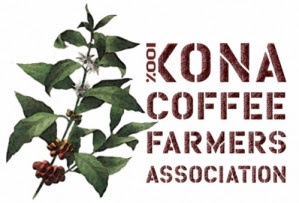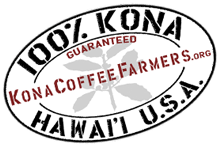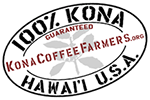“Best Agricultural Newsletter in Hawaii”
Newsletter of the Kona Coffee Farmers Association
May 2022
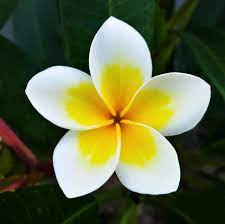
PO Box 5436 Kailua Kona Hawaii 96745 USA
www.konacoffeefarmers.org info@konacoffeefarmers.org
Contents
Sun, Rain, and Research
ProBlad Approved for CLR in Hawaii
Legislative Update
Current Coffee Trends
Farmer Research for Local Inputs for CLR
Joke of the Day
Using Drones on Agricultural Crops
Coffee & Restroom Urgency
Birds & Bees & Coffee
How Long Does Green Coffee Stay Fresh
CLR in Vietnam
CBB/CLR Pesticide Subsidy Program
Berry Borer Talk Story
Editor – Clare Wilson
KCFA Education Event: “Sun, Rain,& Research”
Our first educational event of the year is one you won’t want to miss. World Coffee Research CEO Dr. Jennifer “Vern” Long will join us live at 4:30 pm at Yano Hall on Monday May 16 to talk about perspectives on Coffee Leaf Rust, small farms, and innovative research initiatives.
Hawaiian farmers are in the midst of not one but two global pandemics right now—one affecting coffee people, and the other affecting coffee plants. The global public health response to Covid-19 demonstrates the incredible potential for science to respond to such crises—but only if efforts are collaborative, coordinated, and funded. Coffee leaf rust affects farmers everywhere in the world, and there is incredible global and national interest in finding solutions. Dr. Jennifer “Vern” Long will join us to talk about how building a shared research agenda that includes Hawaii’s interests with those of global growers and U.S. coffee businesses can unlock increased federal support to address Hawaii’s newest challenge. Vern will share with us her optimism on how working together through strong partnership is the key to long-term solutions to sustain the Hawaiian coffee industry.
Please sign up using the link below so that we can plan for attendees. Tickets are not required at the door.
https://www.eventbrite.com/e/
For more information on WCR, visit their website at https://worldcoffeeresearch.
–Submitted by Suzanne Shriner
ProBlad Approved for CLR in Hawaii
From Andrea Kawabata’s Updates (CTAHR)
ProBlad Verde Approved for CLR in Hawaii – Another Tool for Spray Rotation
HDOA approved a 24(c) Special Local Need Label for an organic biofungicide, ProBlad Verde. This product has also been included on the HDOA CBB/CLR pesticide subsidy list.
ProBlad Verde fungicide works on contact, leaf tissue absorption, and has translaminar properties. It is driven by multiple-site modes of action to control fungal diseases within eight hours of contact. Priaxor Xemium is another product that has translaminar properties. Translaminar fungicides move into the sprayed leaf and a reservoir of fungicide (active ingredient) is held within the leaf for a limited amount of time (typically up to a few weeks). Contact fungicides do not provide this extended period of protection.
For more information about ProBlad for CLR and current information about CCB: https://tinyurl.com/42zhrp99
–Submitted by Barbara Anderson
Legislative Update – House Bill 1517
After 30 years of efforts by Hawaii coffee farmers (and 16 years by the KCFA) to reform the “10% coffee blend” labeling law, this year the Legislature moved farther toward protecting the economic interests of farmers and protecting consumers from deceptive labeling than at any time in the past.
Unfortunately, the Honolulu blenders (including the mainland-owned Hawaii Coffee Co/Paradise Beverages/Topa Equities conglomerate) are again using their economic muscle in the State Senate to block any changes to the 10% blend law.
A Brief History of HB1517:
1–At the outset of the 2022 Legislative Session, Kona Representative Nicole Lowen introduced HB1517–a bill with a phased-in 51% minimum for blends, label disclosure of the % of Foreign-Grown Coffee, labeling enforcement, and funds for the CBB and CLR subsidy program. With overwhelming testimonial support from farmers, agriculture organizations, good government groups, and consumer advocates, the bill was passed through 3 separate House committees, adopted by the full House, and sent to the Senate.
2–The Senate—at the urging of the blenders—stripped out the labeling reform measures and replaced them with a “study”, a stall/delay tactic long used by the blenders to block labeling law changes.
3-The 2 very different House and Senate versions of HB1517 have been sent to a joint conference committee to try to reconcile the differences. Rather than allow the Senate conferees (led by Senate Ag Committee Chair Mike Gabbard) to kill the bill entirely, the House conferees have been seeking to maintain the labeling reforms as part of the bill. After 5 days of consideration, the conference committee had still not reconciled differences as of the morning committee session on Friday, April 29.
4–NOTE: The blenders have long used the demand for a “study” as a way to kill bills for reform of the 10% blend law, rather than seriously seeking an actual study. The blenders, with plenty of economic resources to do so, have never funded or published a “study” on their own. They do not, in fact, want a “study” because they know that any reputable economist will confirm the conclusions of the United Nations’ recently published uanalysis and the conclusions of the Feldman study that the 10% blend law takes millions of dollars each year from the pockets of farmers—dollars that go into the excess profits of the blenders. Published studies by reputable economists confirm that Hawaii is failing to protect its farmers in the way other states and regions protect their producers of specialty agricultural crops—for example, Idaho Potatoes, Vermont Maple Syrup, California Wine.
Thank you and a hearty MAHALO to all KCFA members and supporters who submitted written and/or Zoom testimony to legislative committees this year. If necessary, coffee farmers will be back next year to encourage the Legislature to finally take the next step toward having Hawaii join other states and other world regions in supporting specialty crop farmers.
-Submitted by the Legislative Committee
Current Coffee Trends
https://nationalcoffee.blog/
Interesting data from the National Coffee association blog:
“The Spring 2022 NCDT … key highlights include:
- Nationwide coffee consumption is at a two-decade high. 66% of Americans reported that they had consumed coffee within the past day. This is up a staggering 14% since January 2021 – the largest increase we have seen since we began gathering data.
- The COVID-19 pandemic continues to impact Americans’ coffee drinking habits. While 27% of coffee lovers (up 8% from January 2021) are venturing out of home for their brew more frequently, out of home coffee consumption still has not returned to pre-pandemic levels. In addition, we found that at-home coffee consumption remains elevated; 84% of Americans had coffee at home in the past day, up from 4% in January 2020.
- The popularity of specialty coffee is at a five-year high. 43% of American coffee drinkers chose a specialty brew in the last day – up by 20% from January 2021.
Americans love espresso-based beverages. Cappuccinos and lattes are tied for the most popular espresso-based drinks nationally, followed closely by plain espresso and café mocha.”
–Submitted by Carolyn Witcover
Farmer Research on Local Inputs for CLR
With great pride and gratitude, this is an announcement that Organic Farming Research Foundation (OFRF) has granted one-year funding to initiate research about the impacts of “additional” (one application more than normal) Hawaii-produced fertilizer and IMOs (indigenous micro-organisms) on CLR in coffee.
Five organic diversified (including Kona coffee) farms will conduct the researchers. Advice and assistance is working with PBARC and Dr. Hector Valenzuela to establish on-farm “plots” on each farm. In order to determine how the inputs impact tree and soil health, data (plant, observation, soil and yield) will be scientifically collected and analyzed.
An introductory community outreach event will be scheduled during May (watch for emails of announcement!) and conducted in collaboration with CTAHR (SOAP Program/Dr. Ted Radovich) and KCFA. Preliminary results (from the year of experience) will be shared through virtual and educational events in April and May of 2023.
Though efforts are by and with organic farms and organic inputs, conclusions can help all coffee producers. The purpose is to reduce chemical fertilizer and pesticide/fungicide dependency; instead focus resources on Hawaii-based inputs with less or no negative environmental impacts on the eco-system (from the farms themselves, to neighbors and to the air and ocean).
Efforts suggest that the project will be extended for two years through additional support, being sought at this time. Please contact me if you would like to be added to the database to receive research announcements (colemel2@gmail.com).
by Colehour Bondera, working with

Joke for us Old Timers
I left the hardware store the other day, I was fumbling for my car keys and could not find them, weren’t in my pockets. Suddenly I realized I must have left them in the car. Frantically, I headed for the parking lot. My wife has scolded me many times for leaving my keys in the car’s ignition. She’s afraid that the car could be stolen. As I looked around the parking lot, I realized she was right. The parking lot was empty. I immediately called the police. I gave them my location, confessed that I had left my keys in the car and that it had been stolen. Then I made the most difficult call to my wife: “I left the keys in the car and it’s been stolen”. There was a moment of silence. I thought the call had been disconnected but then I heard her voice. “Are you kidding me?” she barked, “I dropped you off!!” Embarrassed, I said “Well come and get me then”. She retorted, “I will as soon as I can convince this cop I didn’t steal your F#@%ing car!!”
Welcome to the golden years! My doctor asked me if anyone in the family suffered from mental illness. I said “No, we all seem to enjoy it.”
–Submitted by Jim Monk
Using Drones on Agricultural Crops
https://tinyurl.com/52d74ztc
“Experts say the future of farming will integrate this technology, but it’s tough to get started.”“The technology has been identified as a viable alternative to many labor-intensive processes on agricultural lands, able to do everything from weed control to helping farmers predict seasonal harvest yields and plant health.”
Coffee & Restroom Urgency
https://coffeetalk.com/daily-
The Real Reason Coffee Makes You Need To Use The Bathroom More Often
The Secret to Better Coffee? Birds & Bees
https://www.comunicaffe.com/

The key characters in this love story? A bee (euglossa heterosticta), a coffee plant, and a bird (rufous capped warbler). Images courtesy of CATIE and John van Dort. Composite by Mary Kueser
How Long Does Green Coffee Stay Fresh?
“How green coffee is stored is key to cup quality. Good storage maintains the cup profile of a coffee, while poor storage can detract from it.
As such, this is understandably something that specialty coffee roasters take seriously, as do producers and traders.
Like any other agricultural or food product, green coffee has a shelf life. This is how long it can stay at an optimal level of freshness before quality begins to deteriorate. However, improper storage and poor packaging can cause cup quality to “flatten”, and result in a diminished sensory profile in the final cup.
To learn more about how long green coffee stays fresh for, just how important storage is, and how you can keep your green beans fresher for longer, I spoke to a few industry experts…”
______________________________
Coffee Leaf Rust in Vietnam
https://www.comunicaffe.com/
Coffee leaf rust disease widespread in Vietnam, a Japanese study shows

Coffee leaves covered in coffee leaf rust (credit: Purdue University/Catherine Aime)
“TSUKUBA, Japan – In a study published this month in Frontiers in Plant Science, researchers from the University of Tsukuba and Ibaraki University have revealed that coffee leaf rust (CLR) disease is widespread in the main coffee-growing regions of Vietnam, the world’s second-largest coffee producer…”
CBB/CLR Pesticide Subsidy Program
ALOHA Coffee Farmers:
Please take advantage of the HDOA Coffee Leaf Rust (CLR) Pesticide Subsidy which has recently been added to the CBB Pesticide Subsidy- 50% back on eligible receipts.
- Send in receipts from 7/1/20 – 6/30/21 for both.
- Please see the HDOA-approved CLR pesticide list for eligible products for reimbursement.
- BotaniGard and Mycotrol are still the only CBB Pesticides eligible.
- Start the online application here and upload your receipts; or use the downloadable pdf to be e-mailed with scanned receipts; or call Melanie Bondera at (808) 328-7578 for a paper application to be mailed.
- $600 cap per acre/year or $6,000 per farm business for each subsidy.
- New farmers will need to set up their file with GET#, SS#/FEIN#, and driver’s license.
- Please email hdoa.cbb@hawaii.gov with any questions.
Melanie Bondera
HDOA.CBB@hawaii.gov
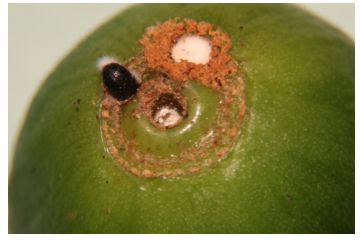
Berry Borer Talk Story
From Roseann Leiner, CTAHR
“Talk Story with COFFEE BERRY BORER Researchers in 2022” will start April 14. The Zoom meetings are on Thursdays, 12:00 noon – 1:00 PM HST. These meetings feature research presentations and time for informal dialogue.
Current Schedule
- Thursday, May 5: Growing Your Best Coffee with an Assist from “Best Beans”: Pest Monitoring, Management, and Decision Support via a Mobile App”
- Thursday, May 12: Claudia Ruiz-Diaz, Ph.D. “Coffee Fruits and CBB – Some Reasons for the Attraction”
- Thursday, May 19: (no meeting -HCA Conference starts in Kona)
- Thursday, May 26: Melissa Johnson, Ph.D. “CLR monitoring on Hawaii Island”
- Thursday June 2: Angelita Acebes-Doria Ph.D., “MyIPM Hawaii: Mobile App Fact Sheet and Management Guide for Pests in Hawaii”
For more information, and the link to register, go to
https://www.eventbrite.com/e/
-Submitted by Barbara Anderson
Recipes Wanted! If any of you have recipes that you would like to share, please submit them to the editor: clarewilson98@gmail.com
LET US KNOW WHAT YOU THINK! >> Write to us. We welcome Letters to the Editor up to 150 words. We reserve the right to edit for clarity and length. Include your name and email address >> Email: info@KonaCoffeeFarmers.org with SUBJECT: Commentary.
